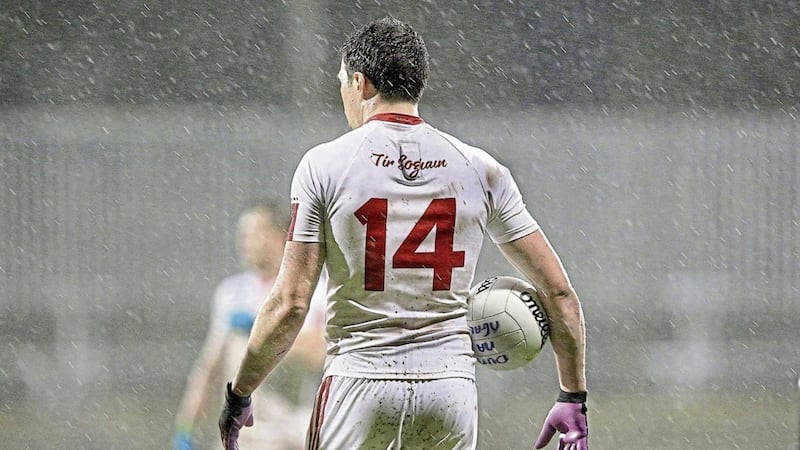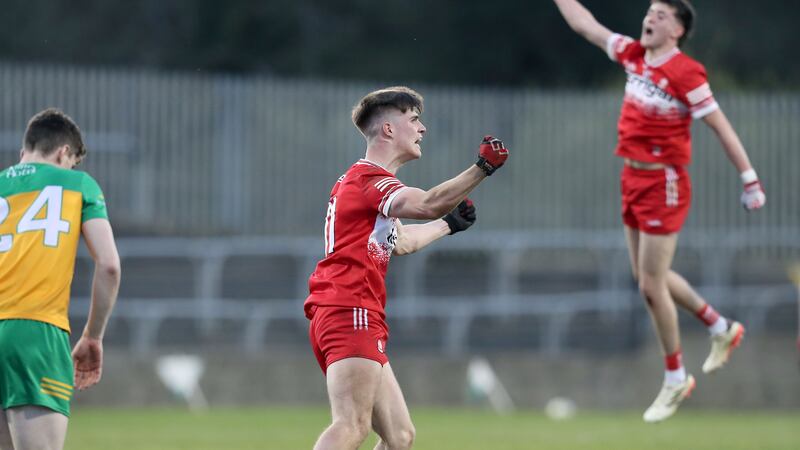IN a way, football is cyclical. What goes around comes around. I’m not sure where Tyrone fit into this, but what is clear is that this is the end of Sean Cavanagh in county football.
He can be proud of his achievements and when he first started out in 2002, I don’t think he could have imagined just how successful his inter-county career would be.
Putting it into context, Tyrone had yet to win an All-Ireland title at that time. It seems that since his introduction they have never been far away from the steps of the Hogan Stand.
He was lucky to come into the mix during a golden generation of special players in the O’Neill county.
In addition, Peter Canavan was the best of the 1990s team and probably Tyrone’s greatest ever player. Just below Canavan was Brian Dooher, a natural born leader.
Despite these two pillars, it took Sean Cavanagh and some of his fellow minor recruits to pull Tyrone over the line in 2003, 2005 and 2008.
Cavanagh’s legacy is one which epitomises the definition of what it takes to be a winner.
On the big days, he delivered, which is the truest test of greatness in a sporting context.
He fouled when he needed to and, at times, took a lot of personal criticism because of his willingness to win ‘at all costs’.
In fact, you could say that particular generation of Tyrone players displayed the exact same characteristics.
I would love to have won a lot more than I did and, in most of the teams I ever played in, this willingness to play on this very fine line just wasn’t willingly embraced.
There isn’t an actual bad bone in Sean Cavanagh’s body. Rarely would you have seen him lash out, something you would have forgiven him for if you had of been subjected to the same kind of personal treatment he received over the years.
He was never drawn into the indiscipline of revenge and this reaction was similar off the field despite the personal criticism he received from the studios and broadsheets over the years.
He was just too nice a fella and some hated him for it.
Indeed, for a significant amount of wider GAA fans, Tyrone were one of the most hated counties throughout the noughties, simply because they were so successful.
Well, that and the fact that the result, however it was achieved, always justified the means.
I think if Sean felt there was another All-Ireland in Tyrone, he would possibly have stayed on at this level.
I can agree with him for walking now, as Tyrone look as far away as they did in 2015 and 2016 for the All-Ireland. Not because they are a bad team.
They are by far the best team in Ulster, by a country mile in fact. But they simply are not at the same level of Dublin and, as long as a vice-like grip is held on the national titles by this set of Dublin players, nobody other than them will be climbing the steps of the Hogan Stand.
So it is Mayo who have the slimmest of chances, but it will take the exorcism of the 1952 curse and a tactical masterclass from the Mayo management team to effectively overcome an inevitable third All-Ireland title loss on the trot.
Last week, I wrote that this Dublin team’s legacy holds a very important place in their goals.
I can only surmise that this legacy is predominantly intrinsic for Dublin players.
It means something to be on the starting 15 of one of the greatest teams to have played the game.
This possibility provides the ultimate motivation for any player worth his salt – especially when there is at least one (if not two) player(s) of equal ability, skill and standing ready to take your jersey should you have a mediocre performance.
The ruthlessness and sheer brilliance in rendering Tyrone’s seemingly impenetrable defensive system irrelevant makes any opposition task look like climbing Mount Everest bare-footed without oxygen.
We all thought Tyrone would make a game of it. Fifteen minutes into this match, however, the game was gone.
This was not going to be the admirable glorious defeat witnessed a few hours earlier in Las Vegas from Conor McGregor.
This was a Rocky Balboa moment from Rocky III when Clubber Lang (played by Mr T) annihilated Rocky in their first boxing match.
It was sad to watch then and, from an Ulster perspective, this was sad to watch too.
And unlike that Hollywood outcome, I don’t think a rematch would provide a different result.
If Tyrone are so far ahead of every other team in Ulster then surely you have to question Ulster football’s quality and ability to be competitive in the short-term.
It would take the pick of players in Ulster at the minute to give Dublin a game. And it is our own fault, provincially speaking, for copying a tried and tested model of failure which is well past its sell-by date.
Playing with 13 and 14 players behind the ball may win you a provincial title, but sooner or
later this will change too.
As far back as 2012, Jimmy McGuinness knew this and the result was a much more complete and offensive winning team in 2012.
By 2015, the system was outdated and no longer a winning formula for an All-Ireland title.
Currently a defence-dominated team structure won’t even win you a National League title. To beat Dublin, Mayo gave other teams a way in 2016.
Jim Gavin has talked about Dublin not showing up to last year’s final. Well, they had two opportunities to ‘show-up’ and, on both occasions, Mayo narrowly threw the game away.
So I don’t think it is outside the realms of possibility that, if a team is brave enough, Dublin can be beaten. However, unfortunately Tyrone proved that standing off and zonal marking certainly isn’t the answer.
To their credit, though, the Red Hands have won two Ulster titles in two years. They have regained that particular stranglehold.
However, you have to wonder what more Mickey Harte wants to achieve.
Sean Cavanagh only played under one manager at minor and senior level and that is one hell of a long time. The only thing I can say from my own perspective is that, with each management team, I learnt something and got better.
Call it freshness, call it motivation.
You get the feeling from Tyrone that if their relationship was a marriage, the county board and Mickey Harte would be sleeping
in different rooms at this stage.
The relationship is about respect for the past.
A lot has changed since 2003 when Sean Cavanagh and Mickey Harte won their first All-Ireland together.
The highs of those intermittent years have been matched with as many lows and these have no doubt impacted on both men’s lives immensely and also the decisions they make now and in the coming months. As a consequence, Cavanagh has been afforded the respect to make a decision on his own future for Tyrone. At the very least, whatever opinion one holds about Mickey Harte, he should be afforded the same courtesy.







